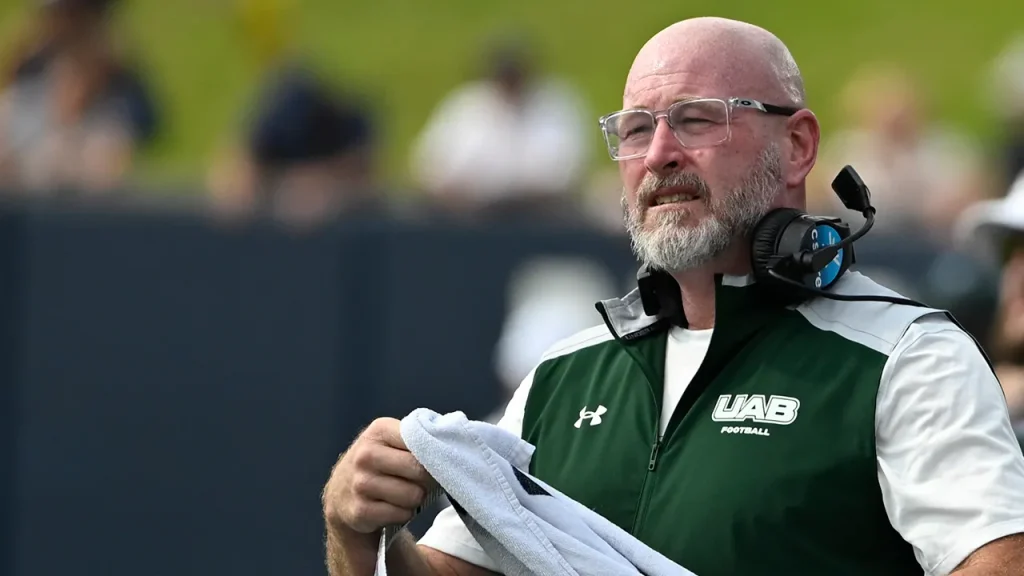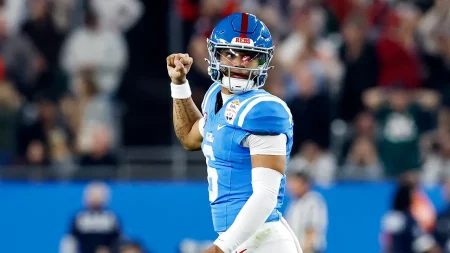Trent Dilfer’s Departure from UAB: A Story of Unfulfilled Expectations
In a decisive move that came after a disappointing 2-4 start to the season, the University of Alabama at Birmingham (UAB) has parted ways with head football coach Trent Dilfer. The final catalyst for this decision was a 53-33 loss to Florida Atlantic University, marking another setback in what had become a pattern of underperformance for the program under Dilfer’s leadership. UAB Athletics Director Mark Ingram announced the decision with a tone of regret but determination, acknowledging that despite Dilfer’s commendable character and dedication, the on-field results simply hadn’t measured up to the university’s standards for its football program. This abrupt conclusion to Dilfer’s tenure at UAB represents a humbling chapter in the career of a man who once reached the pinnacle of professional football success.
Dilfer’s journey to UAB came after an impressive run at Lipscomb Academy in Tennessee, where he compiled a remarkable 44-10 record from 2019 to 2022. This success at the high school level, combined with his NFL pedigree as a Super Bowl-winning quarterback with the Baltimore Ravens, made him an exciting choice to lead the Blazers when he was hired before the 2023 season. However, the transition from high school coaching to the more complex and demanding world of college football proved challenging for Dilfer. Despite his professional experience and previous coaching success, he was never able to guide the Blazers to a winning season during his brief tenure, highlighting the significant leap in complexity and competition between different levels of football leadership.
What makes this situation particularly poignant is the contrast between Dilfer’s past glory and his current professional setback. As a 13-year NFL veteran who played for five different teams—the Tampa Bay Buccaneers, Baltimore Ravens, Seattle Seahawks, Cleveland Browns, and San Francisco 49ers—Dilfer had experienced both the highs and lows of professional sports. His crowning achievement came with the Ravens when he helped guide the team to a Super Bowl victory, cementing his place in NFL history. This background made his inability to translate personal playing experience and high school coaching success to the college level all the more disappointing for both Dilfer and UAB supporters who had high hopes when he was brought aboard.
In his statement, Ingram struck a compassionate note while making it clear that the program needed to move in a different direction. “I wish Coach Dilfer the best and thank him for his class, tireless work and commitment during his tenure at UAB,” Ingram said. “While his efforts did not translate into a winning record, each young man who played for him will be a better person as a result.” This acknowledgment of Dilfer’s positive impact on his players’ character development, even amid on-field struggles, speaks to the complex nature of coaching at any level—where success is measured not only in wins and losses but also in the personal growth of young athletes. The university has named Alex Mortensen as interim head coach to lead the team through the remainder of the season while they presumably begin the search for a permanent replacement.
This coaching change at UAB occurs against the backdrop of the increasingly pressurized landscape of college football, where patience for program building has diminished as financial stakes have risen. The mention of Penn State’s James Franklin facing similar challenges (though the article appears to contain erroneous information about Franklin’s status) underscores how even established coaches at prominent programs face intense scrutiny and limited time to produce results. For smaller programs like UAB that are working to establish themselves more firmly in the college football consciousness, the margin for error is even slimmer, and the pressure to find the right leadership match is immense.
As UAB moves forward and Dilfer reflects on this chapter in his coaching career, both parties find themselves at a crossroads. For the university, the challenge is finding a leader who can elevate the program to consistent competitiveness in an increasingly challenging college football environment. For Dilfer, this setback provides an opportunity for professional reflection and growth—a chance to reassess his approach to college coaching and determine his next steps. His story serves as a reminder of the difficult transition between different levels of football coaching and how past success, even at the highest level as a player, doesn’t guarantee similar results in a coaching capacity. It also highlights the human element of sports—behind the statistics and win-loss records are real people navigating complex careers with both triumphs and disappointments.














